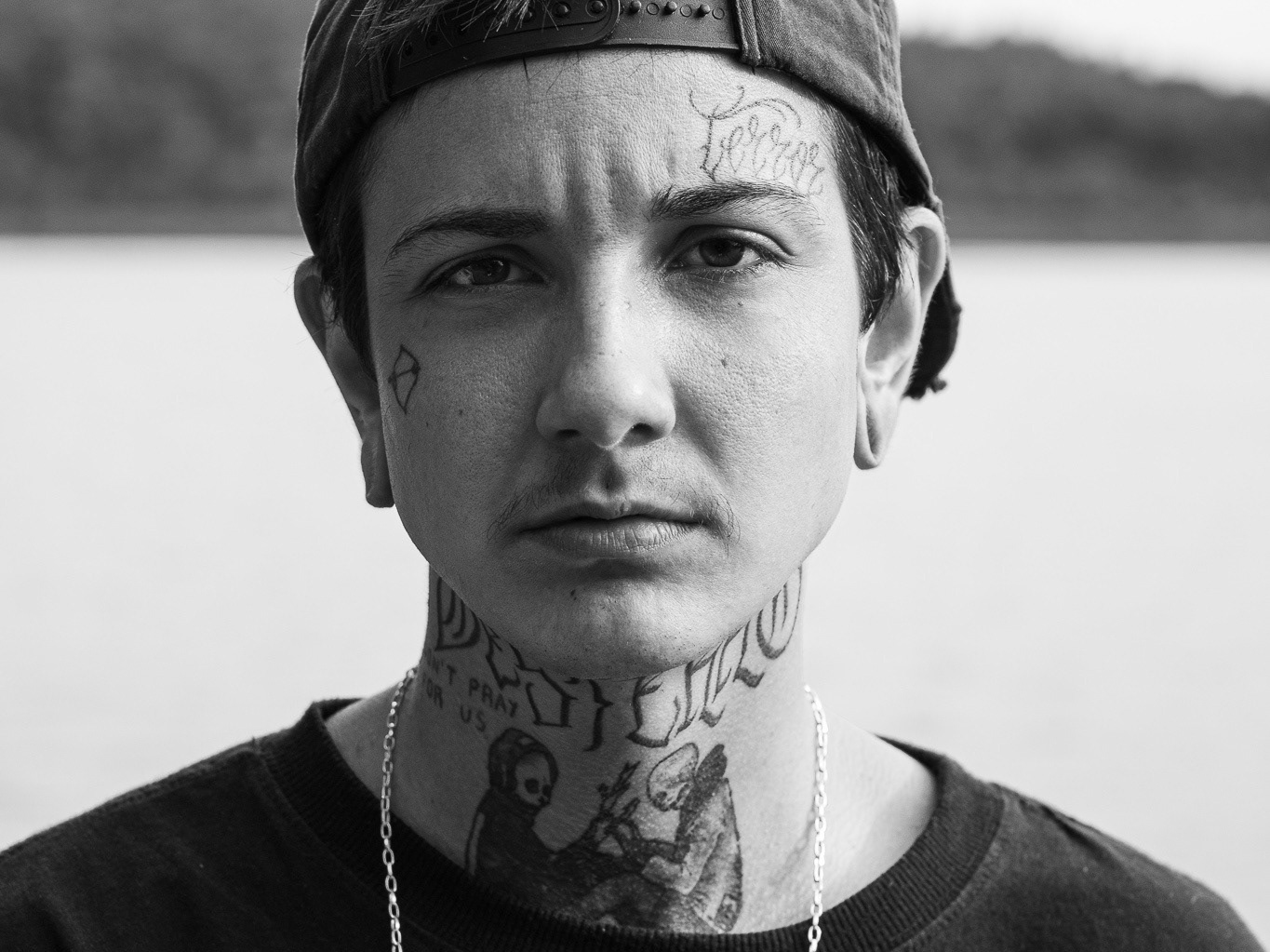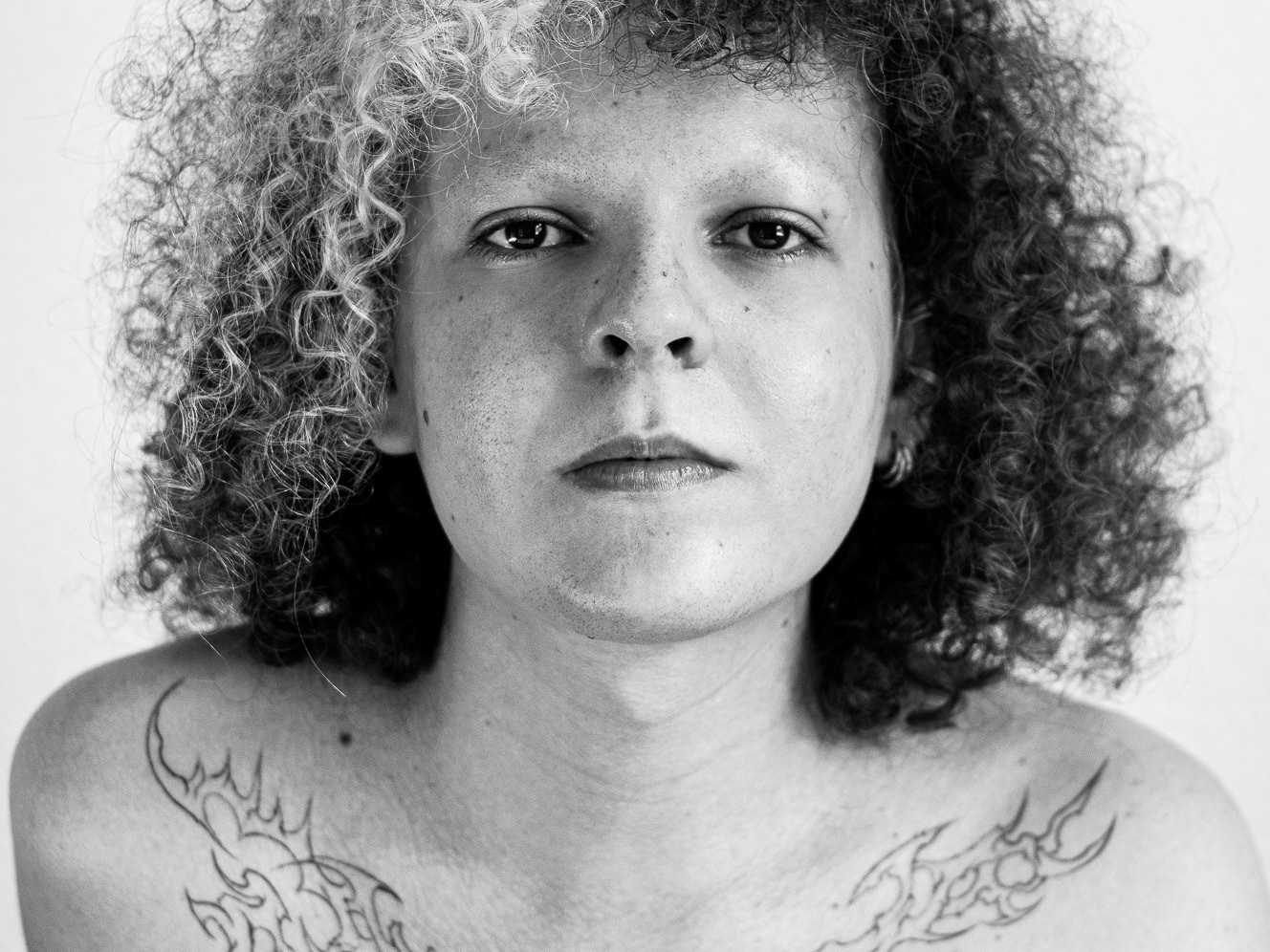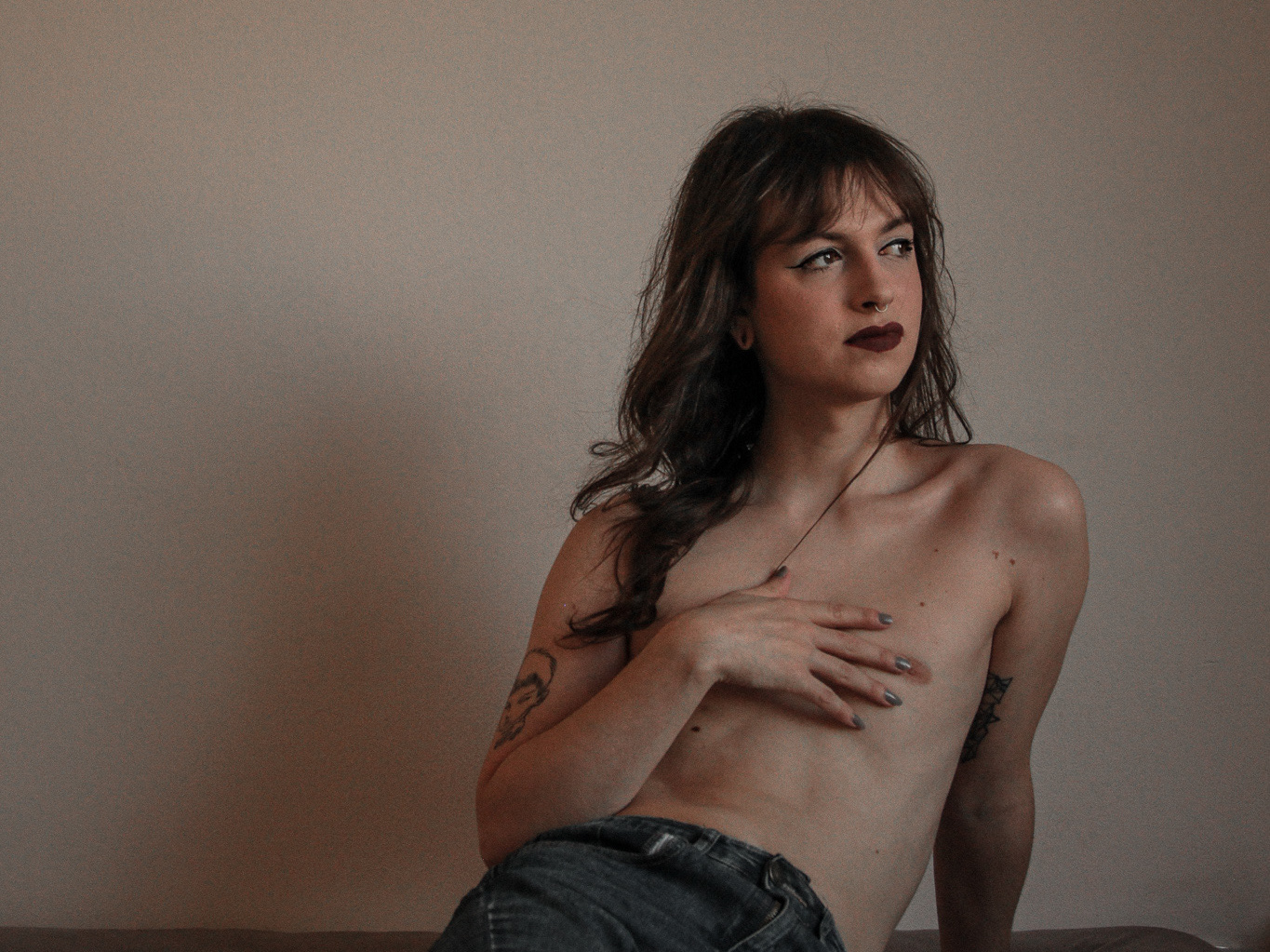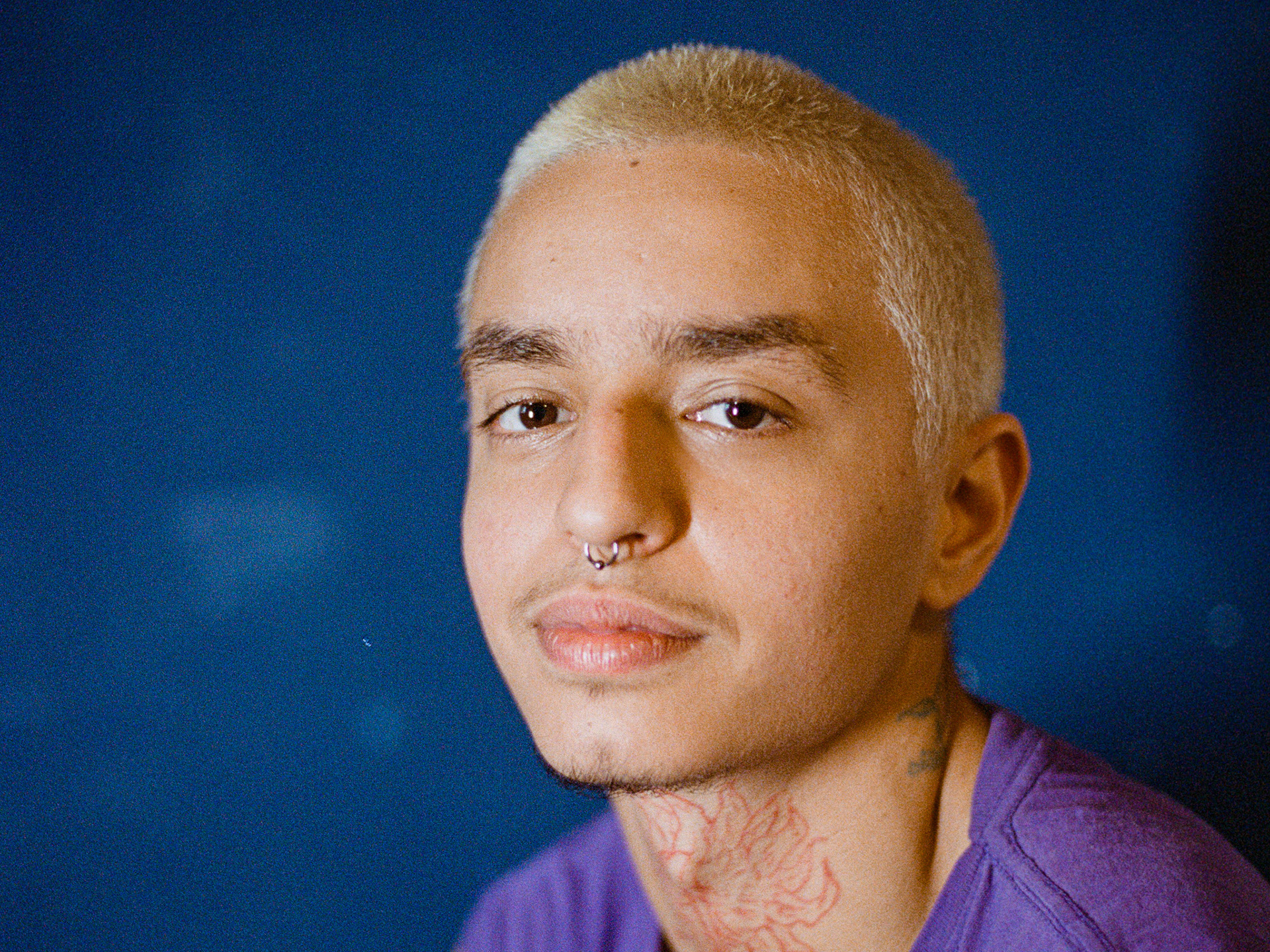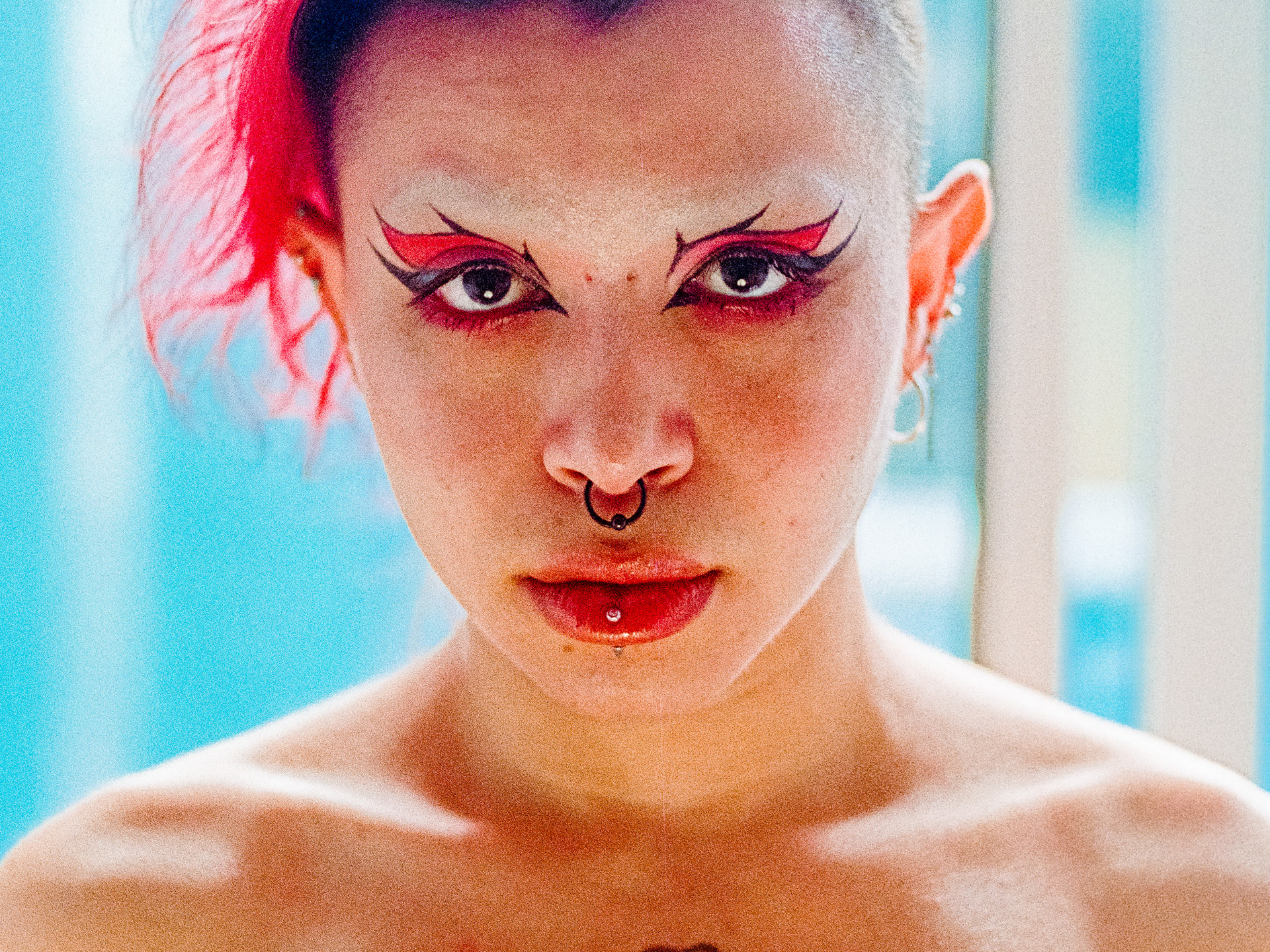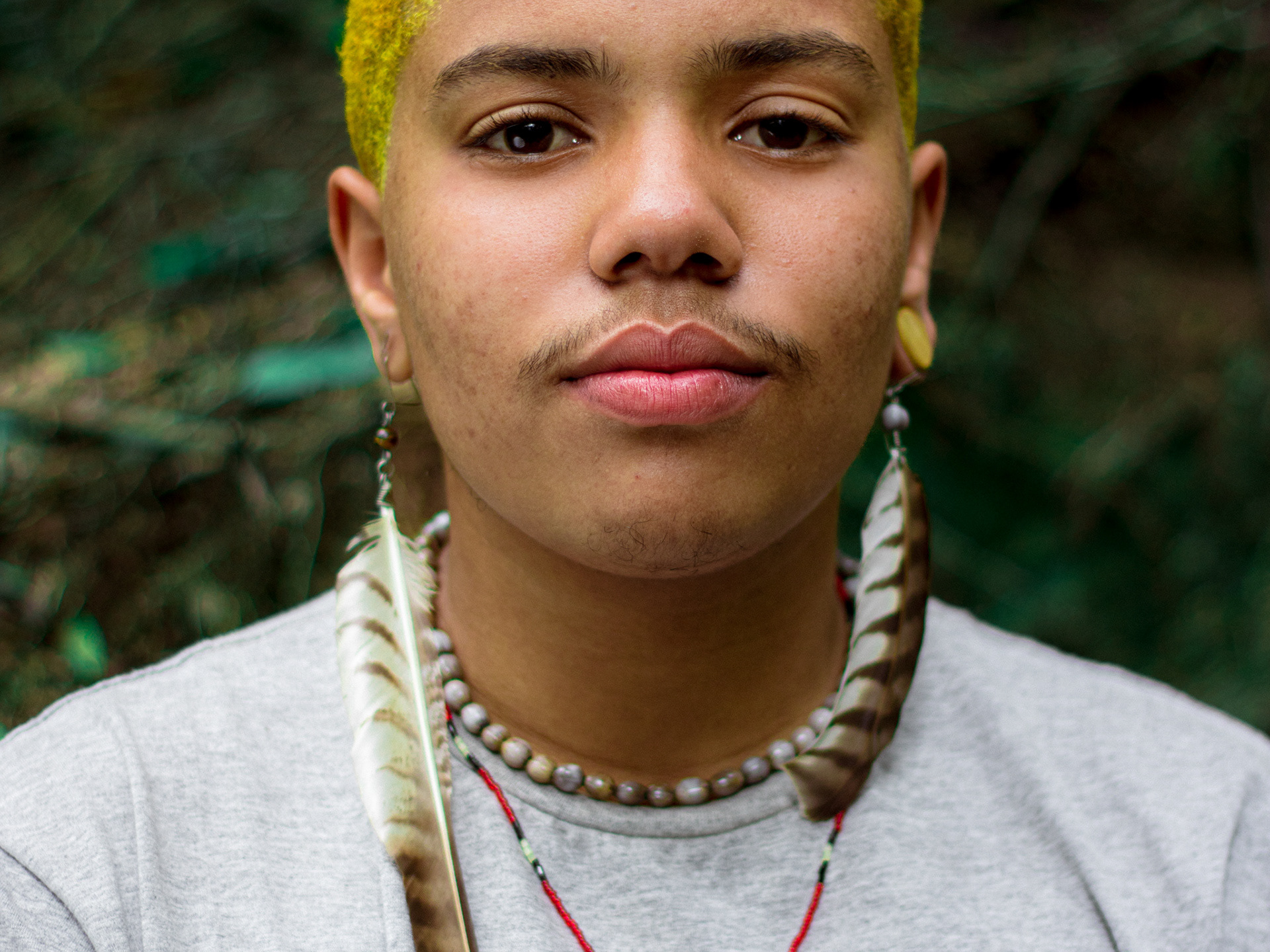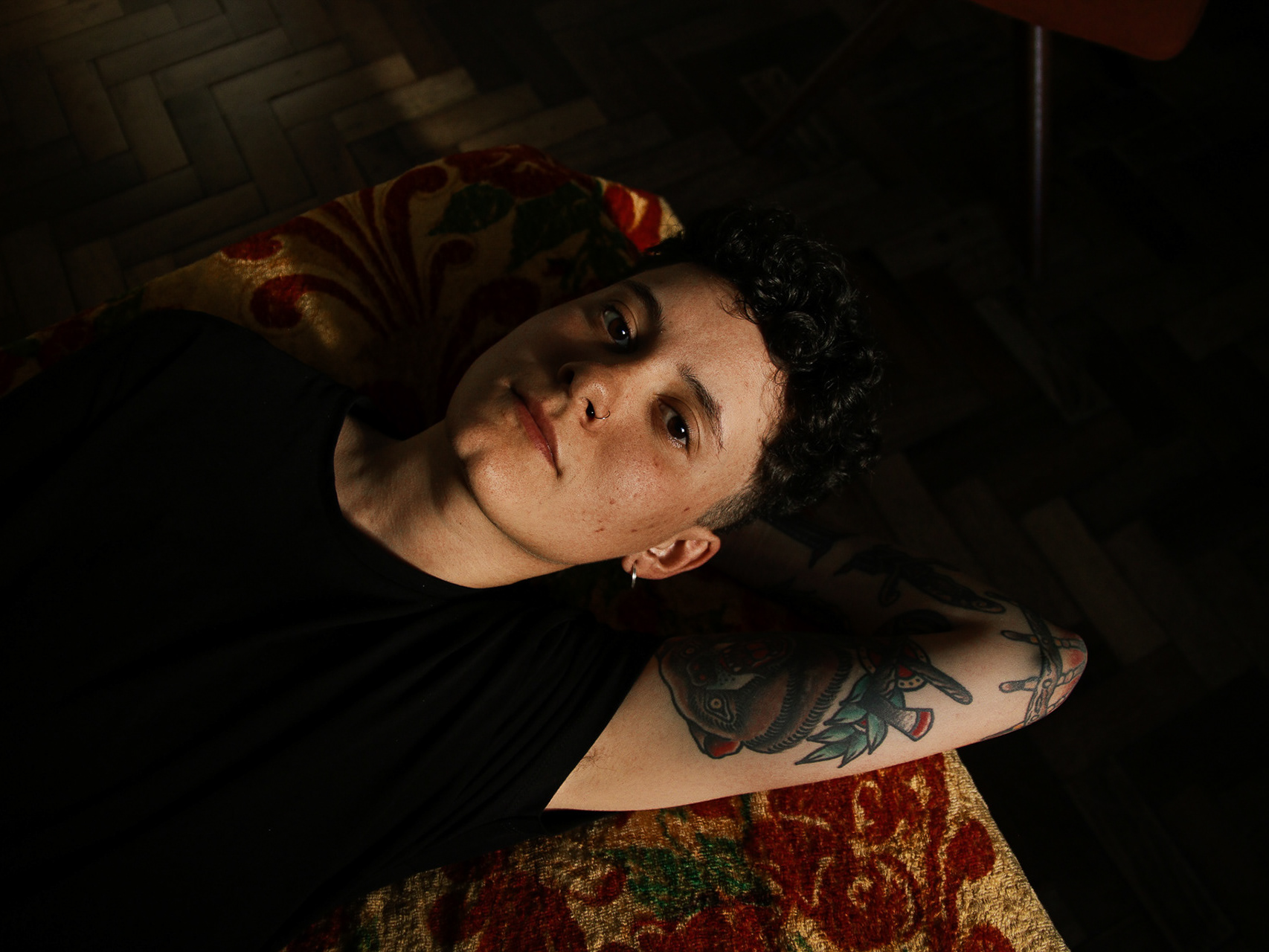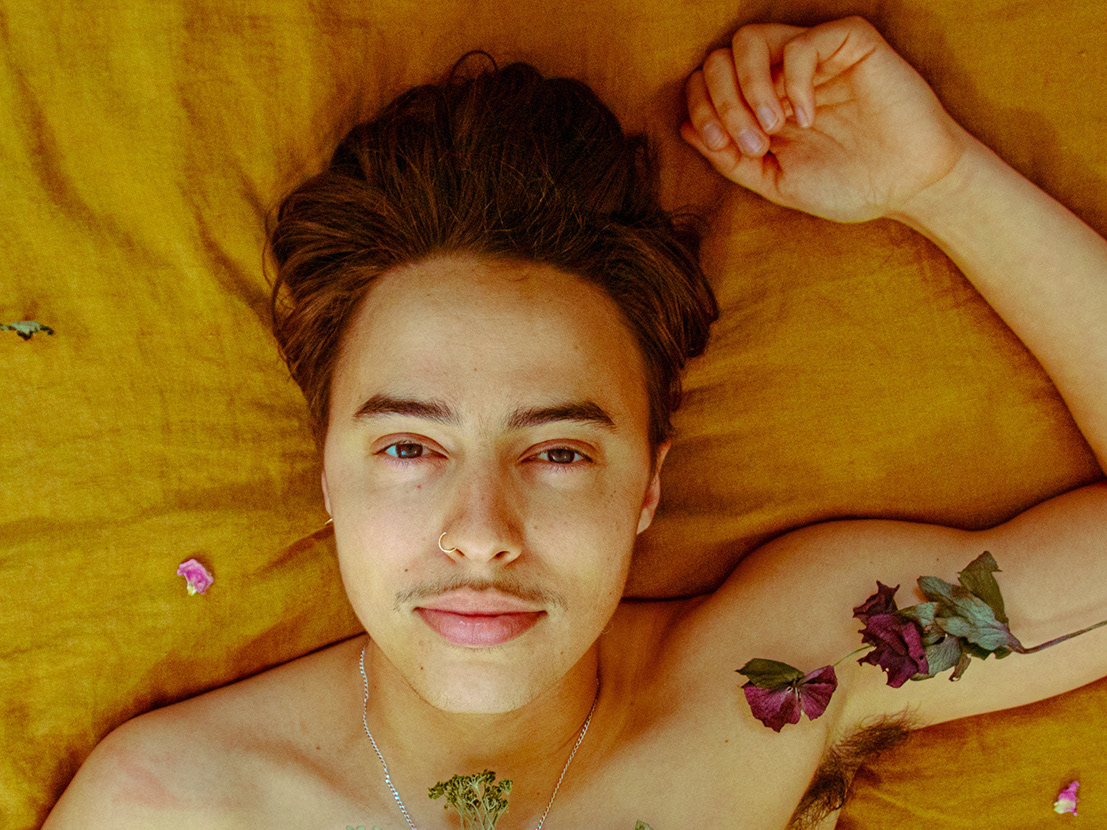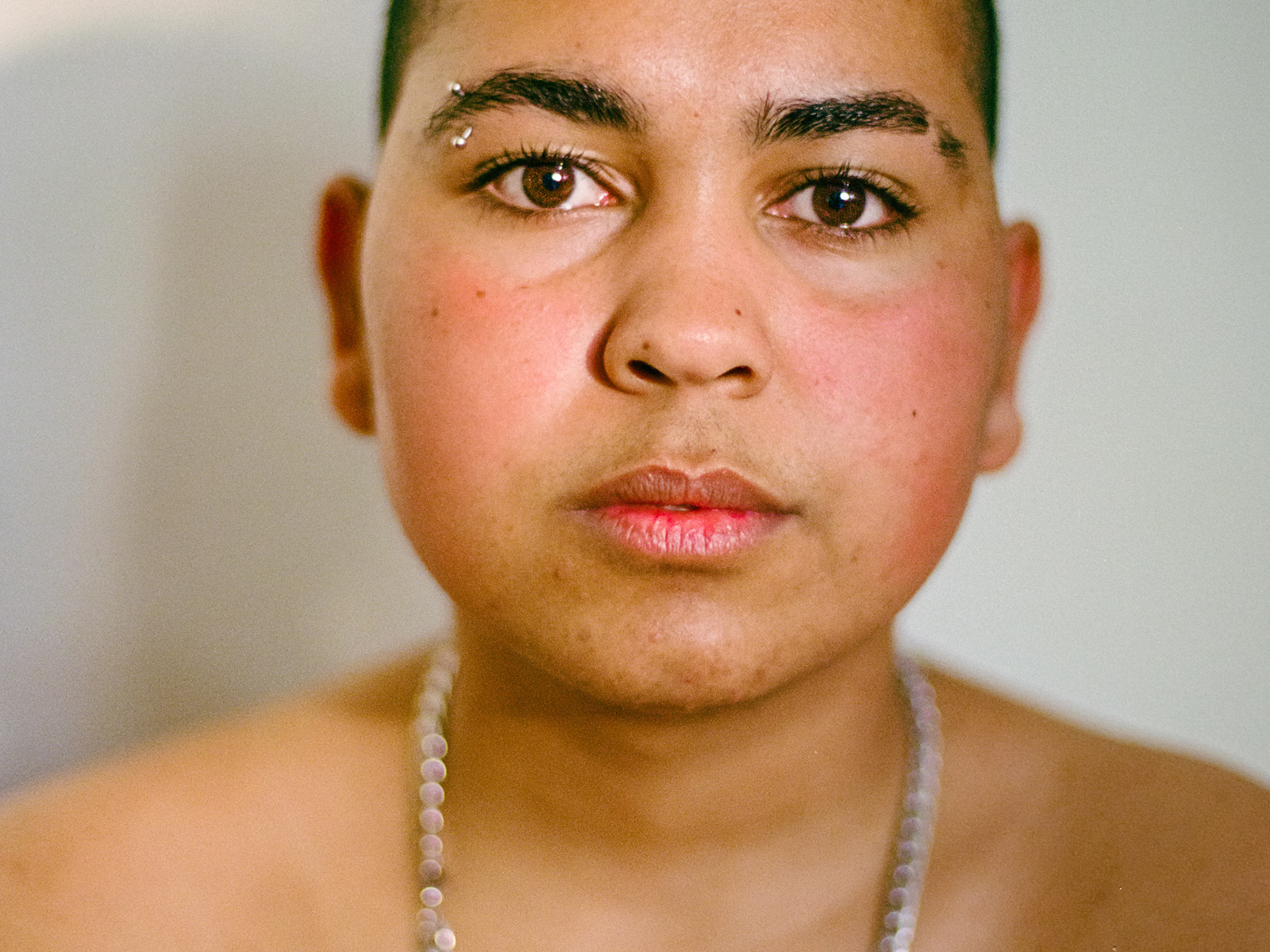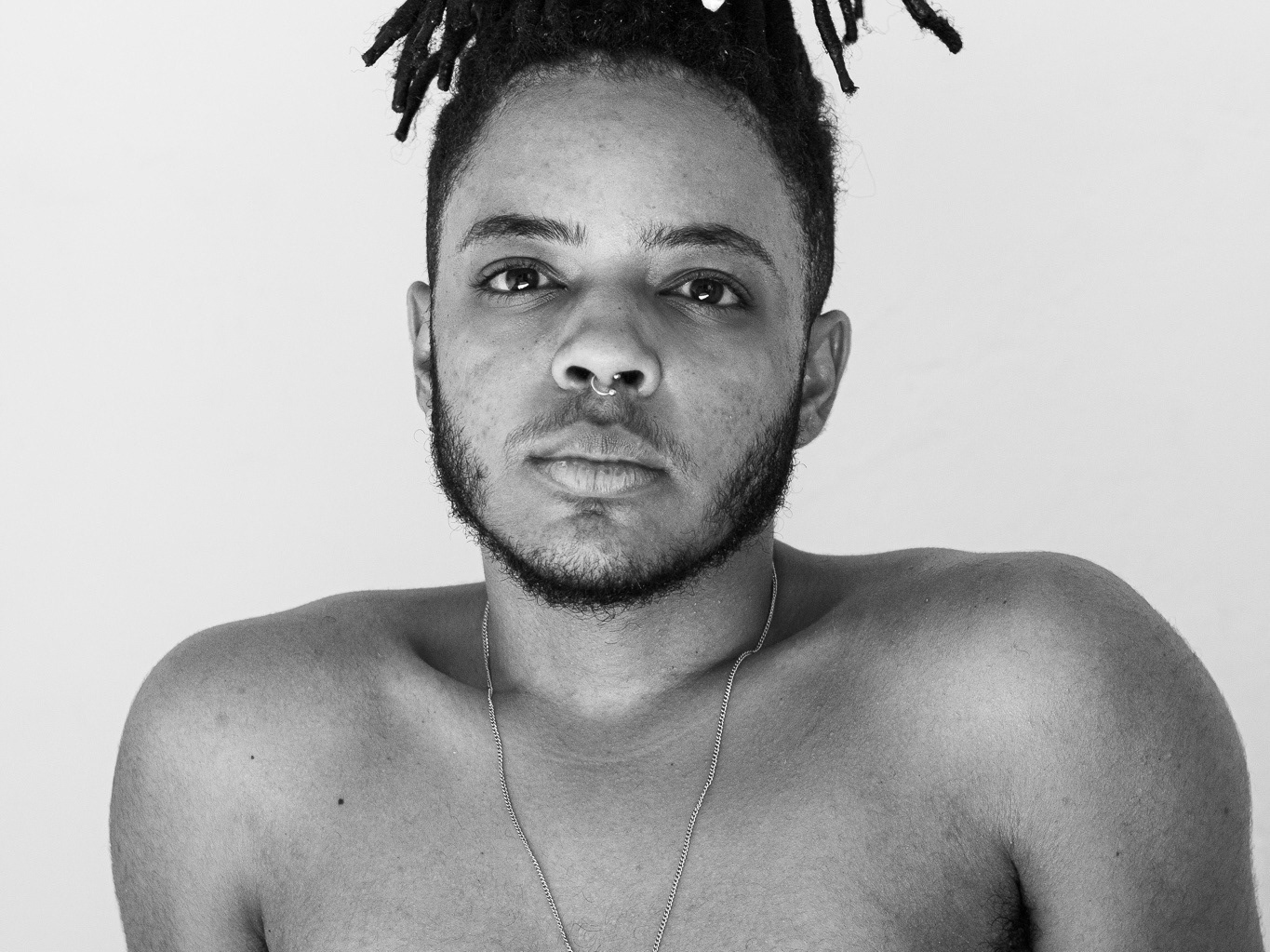My name is Masina Pinheiro, I'm 35 years old - I'll be 36 in 4 days or so. I live in Rio de Janeiro and am a non-binary trans person. My research in art is about dissident childhoods - I always use the phrase “I want to imagine free dissident childhoods”. I also consider myself a photographer. I work in art education, I teach a class called “Circle of Memory and Perversion” and I have ventured into art curating.
Though I use the term "childhood," the research on childhood encompasses much more, addressing various aspects. As an artist, nearly everything I create traces back to my early years; my work is profoundly autobiographical. It seems that events from my early life have been profoundly decisive for how I love or hate my body, how I photograph, how I think about narrative, how I walk on the street, how I dress. Sometimes these choices stem from a desire to overcome early violence, because from an early age I knew that I loved very strongly. I think that from a very young age I also knew what I wanted to do, which is to work with images and audiovisual media - although I didn't have much reference or knowledge about others who were doing the same thing back in the early 90s. Childhood, to me, also carries a sense of magical uncertainty, especially when it comes to identity, we have a great deal of freedom, this fascinates me. We are talking about social relationships, not exactly about a label, about a path defined early on. Discussing childhood brings forth intense emotions within me. It is this fascination and emotional connection that drive my in-depth research. When delving into the subject or teaching about childhood, I always begin with the most challenging aspects… It goes beyond violence, there's much more. Well, I think that's it, childhood serves as a guideline, because every autobiographical work that I did comes from what happened in childhood.
I see it as a healing process. I even believe that among the many types of legacy that the disobedient gender experience generates, one of our legacies is retroactive; it involves looking back, you know? It's about creating a happy childhood today so that past childhoods can relive those experiences. I remember vividly when I was very young, and I tried to brush off the insults people hurled at me, but those insults precisely defined what I was, and I knew I couldn't accept them. It starts with "faggot" or something similar; perversion is the central word, I think. But I remember the need to dissect the words and separate things, like "let's call it vulgar" - but let's call it vulgar because my affection is the very image of perversion to them, right? At the same time, I remember thinking, "okay, I can be vulgar, but I am not repugnant." I have to figure out which words from those insults I will accept into my life and which ones I will discard.
I also remember a time when I was thinking about perversion, I came to the reflection that we are children of perversion and perversity, you know? Our mother being perversion and our father being perversity. Perversion is what they accuse us of, and perversity is what they do to us, most of our childhoods falling within these categories. Of course, many experiences differ, but violence is such a common occurrence that we sometimes normalize it. Sometimes it's impossible to normalize because it affects us directly, on our skin, but psychologically it leaves us profoundly damaged. We despise this perversity, yet we end up performing perversion, even surpassing it, like, "oh, you say I'm like this" - I don't know the exact words they use for childhood; they use anything for childhood - "so now I will become that, and I will be much more than that. I will exceed this word; I will embody the epitome of perversion." The feeling is that I will heal when I embrace their disdain, when I understand that within their disgust lies a grain of truth, and I want to perform that disgust. I can't explain it. I think I'm being a bit harsh on myself, but I say this from a place of affection too, from love. Several words I tried to kill, I found myself later in life trying to revive, trying to bring back, saying: okay, I want to be, I finally want to create vulgar art, I want to work with pornography, I want to show what sex is, since rape is the world's favorite weapon, and it's what has halted so many lives. And photographing sex, capturing affection, it's as if we have one more chance to relearn what it is, even though the memory of touch is difficult... anyway, stories, survival of that.
These stereotypes imposed upon us are the inventions they made of us. But now, we have to invent ourselves too, without fear of crystallizing anything they might imagine. I don't even want to imagine what they imagine anymore.
I acknowledge the dilemma that arises when we talk about childhood and recognizing oneself as a trans child. I recognize the dilemma because, in the end, no performance will deeply signify a defined gender, you know. We've understood that things need to and can expand within our understanding. But what happened to me was a bit strange, I think. What happened to me made me think a lot, even during my second childhood and then my almost pre-adolescence, adolescence. Firstly, I don't think I ever identified within cis norms, even though I never actively sought recognition from anyone, not verbally, that is. Well, except for my mother, to whom I said I wanted to be a girl. Yet, I think I was very young, and I didn't exactly know what I was trying to say, or maybe I did, I don't quite remember anymore. But what happened was that my body was saying something else, even before I knew what to say. My body called me a girl, you know. People on the street would call me that, and it pleased me in a certain way, but it also made me afraid of what my father might think or of being found out in public. I was afraid to open my mouth, for them to hear my voice, see my hair, to know that I'm nothing like what they assumed.
This immense uncertainty was a significant part of my process, even during my pre-adolescence, as I didn't produce the expected hormones. I didn't grow body hair, and my voice didn't deepen with puberty; it remained high-pitched. This was also a very distinctive trait of my personality, my high voice. I noticed that people were hesitant to call me a boy; they didn't know what to do with me in physical education class, or in general. They avoided addressing me; they knew I wouldn't respond because I didn't want to use my voice. I don't know; I sort of retreated into a kind of hole and silence, you know? I also say that I lived through a legacy of immense embarrassment. I thought everything I was going through was extremely ridiculous, so I had difficulty explaining to people what was happening. Because I didn't see anyone going through something similar, not around me. I also didn't have access to research to find out if somewhere far away, on that vast Orkut platform, there was another person going through the same thing.
Later, when I was a teenager, I confused things; I thought being androgynous meant being trans. That idea attracted me a little, but at the same time, I questioned it constantly. Anyway, I sometimes used my Fotolog to post selfies or almost post pictures of the dresses I wore, with hair falling down my arms and chest. I don't know exactly when I understood that I didn't need to be at either extreme, but it was pretty early on. It was strange because even people who sort of respected me, at least to my face, in the building where I lived and such, didn't know what to do with me. In my building, there were a lot of straight boys, all friends of my brother, so they treated me more or less okay. I remember they used to play RPG, and when I played with them, I would use a female name and such; it was always something like a "witch". Everyone expected that from me... I don't know, I can't explain it; it's very complicated to explain. I don't even know what they expected, or if they didn't think about anything either. Very strange. I consider myself a trans child because I never saw myself as cis, especially until I was 23. After puberty took over my body, after I went to 300 endocrinologists and my voice changed, and went through that embarrassment, I grew facial hair, tried short hair, tried fitting into something, being seen differently, but it's not a small thing. I also think I lost my body very early, and it's difficult to have a childhood without a body.
I think this ties into the photos we took. It's also very difficult to be trans without a body. I believe the realm of non-binariness is a balsam for me. Being trans without a body is very challenging. I need, I don't know, to figure out the clothes I'm going to wear. Wearing the clothes I want is hard because without a body, what you have to do is completely cover up. I think I had to learn to be trans outside of my body first. I don't know if I'm making any sense because it's hard to talk about, you know?
I think my most intense gender experience, from worst to best, happened very quickly. At that time, people didn't talk about many things, books on this subject were still rare, and I didn't know how to find them. If Judith Butler had published something in the past, I didn't exactly know how to find it, how to reach it. The same goes for music. I remember discovering Anohni as Antony and The Johnsons, and I was fascinated by the lyrics of the songs and the artwork of the album. All of that reached me without language yet, but I watched Anohni's interviews. There's one performance where she sort of cries and pats her face as if to calm herself down because she needs to keep singing. I remember deeply identifying in these small moments, and thinking: my god, I need to have Anohni poster on my wall because I feel exactly this way. I pat my face when I can't control myself; I make the same gesture, the same body movement. Those kinds of things. Then, I somewhat resigned myself with not knowing anything about myself, not thinking much about the name I wanted to have, none of that. I started focusing only on the issues from my violent past, until Anohni transitioned, and then other people started openly identifying as non-binary. I read a bit about it online and tried to recollect everything I had experienced and make some sense of it all.
I also have a very strong image of the restrooms in my mind because I knew many cis gay boys who grew up partially disguised, with femininity showing in some gestures, ways of acting, or speaking, yet with short hair or something similar, so they could use the restroom. Then, in adolescence, with a deep voice, they could almost live normally within the gay community. I remember this immense distance I had: I couldn't use the restroom; I had to learn how to control my bladder very early too. Even after I entered college, I still couldn't use public restrooms. All these markers set me apart from the group that grew up differently. It's still difficult today to find... not something that represents me, not a mirror, none of that, but... any echo amidst this beautiful and vast spectrum, reflecting what I went through. But I think non-binariness was the most inviting territory and made the most sense to me.
There were a couple of times in my last speech where I held back from using the word... I'm holding back again, for the third time. Like, I don't want to seem like I'm distorting what it means to be non-binary, but I remember many times feeling an immense attraction to the bizarre, to strange things, and such, feeling like an alien. Ugh, I always had a fascination for that too. I remember when I met Caio, who is my best friend; he's a cis gay man. We clearly lived nothing similar. Our childhoods were completely different, everything was entirely different, but I remember sensing in him a love for my aberration, I don't know, for my weirdness. It took a while for me to feel human even after childhood.
I think my brain became very weak after the violences, and I had forgotten so much, which was gradually recalled over time, during my art work. I started to take pride in who I was as a child. I began to remember the things I used to think about, engaging in exercises to revisit those memories. Or those almost silly exercises we do in therapy, although it wasn't therapy with a professional or anything like that; it was just an art project, facing myself, facing the little child within. Talking to them, or simply looking at them. Nowadays, I think I found myself beautiful, you know, even though back then I felt like an alien, a mixture of the universe's least recognizable things. But now I look back and think, "My god, I wouldn't have wanted to be different. I'm glad I let my hair grow down to my waist, I'm glad my voice was bizarre and very thin, and incredibly strange." I'm not even sure, but I think I had a bit of that notion because I didn't let anything change me. I think I was strong too, stronger than I am today. Despite all the violence, I didn't pretend, I didn't camouflage myself; I couldn't hide. But I could only not hide because I chose not to. So I think that makes me proud. I wanted this aspect of me to be more present in my art, in my work; I will try to make it more visible. I've never said this out loud, so maybe this is the first step. Remembering myself when I still had a body makes me want to reclaim my body.
[ G: I think your art talks a lot about pride. Maybe those who don't understand it correctly and put us all in a box will see that it's always just about violence. Or when it's not about violence, it's about shocking society. But I think it's very strong. For example, in the work there are stones wrapped in foam - maybe I heard you talk about it or maybe I made it up in my head and now I don't know if that's my thought or if I heard you talk about it (laughs) - but for me it's about really creating that protection and softness. And it's also interesting because you're not trying to make the stones not exist. But there is this protection. And by not trying to make the stones not exist, you don't erase what happened. For me, this speaks a lot about pride. ]
M: Wow, that's true. I mean, I've never stopped to talk or think exactly about this, but in a certain sense, of course, the stones will never disappear from my life. But at the same time, if I were to erase the stones, I would erase the fact that I ran away from them. And coming home with a hurt leg, thinking what I thought, and still being who I was. You can't erase something and forget that because of it, or despite it, or whatever, I continued to be who I was, I would erase a moment where every time I decided to keep being young Masina.
First, I envision a trans future in free childhood. Therefore, a trans future doesn't even need the word "trans," because childhood doesn't require these words. It needs protection. I think the word "protection" is key. I prefer protection over love. I prefer protection over love because I think that's what's lacking. I believe love can be too condescending, like "I understand you," "I respect you." I think protection is much more important. So, I see a trans future with a lot of protection and free childhood to be or not to be.
I see less need to ask people to look at us. I see a lot of rescue too because I think the trans legacy recognizes that many experiences were left behind. I see looking back and reimagining anthems and gods and people who have died, somewhat trapped in binary thinking, I see a trans future rescuing these experiences from living archives, not just in museums. Rescuing stifled experiences. I also see it in those who are still alive... Because, well, I don't consider myself old (laughs), but I think, wow, I really wish I could find other people who, at 35 almost 36, still don't have a body, you know? And only later discovered they have one, or could use it, or could be. I keep imagining that maybe it's crucial to understand that trans time expands in both directions... It's difficult. I wish I had another chance to have been the trans child I was. Or another chance at so many things like that. We grow up without vocabulary, without ontology, without anything. The trans future is also about saving past trans experiences, giving them names, offering protection. Because it seems like we don't live there anymore, but those things are still inside us, right? I don't know, right now I'm kind of Einstein, fabric of time, all dimensions together. Kind of quantum physics.
I remember the end of a song Nina Simone wrote for Martin Luther King when he died. She starts remembering people who have already passed away and advises: "stay close to the people you love." And this sense of protection is the only thing that truly saves us from death and from our own small deaths and thefts. Protection is much more essential than everything else, being close, being beside. I remember a friend named Gabriel I had in school, straight, but my god, he was an alien like me too. He physically fit into everything; he used the men's restroom, played basketball, etc. But he stood by my side when I needed him. I don't think he consciously realized that when he stood by me, people wouldn't bother me as much. But just being there signifies so much; it means you're not ashamed of that other person, it means you don't care about what other people think of you. It takes a lot of courage to protect or to be close.
-
This project was idealized and is made by Gabz, a trans non-binary multiple-language artist. ser trans is a project that portrays and also makes room for trans, travestis and non-binary people to be the protagonists of their own stories. We are seeking for representation in front and behind cameras. This project started out of urgency. Ser Trans is made also in collaboration with Lau Graef, Luka Machado and Morgan Lemes.
"ser trans" is autonomously produced by trans people and all content is offered for free. You can help sustain this project by sharing it with friends and making a one time or recurrent donation - any value is welcome. Thank you for supporting a project made by trans people <3
SUPPORT THIS WORK
Gabz self portrait, developed by Eloá Souto, scanned by Lab:Lab
